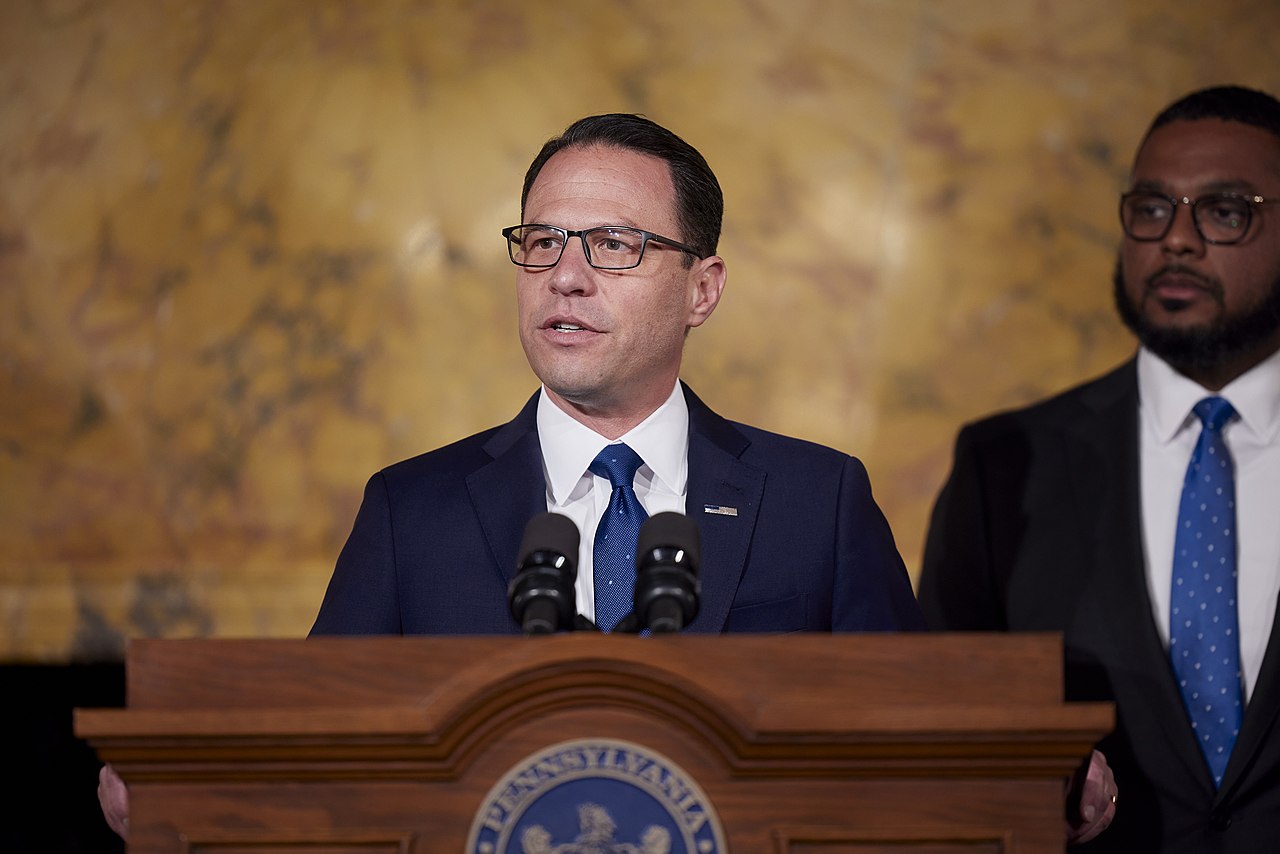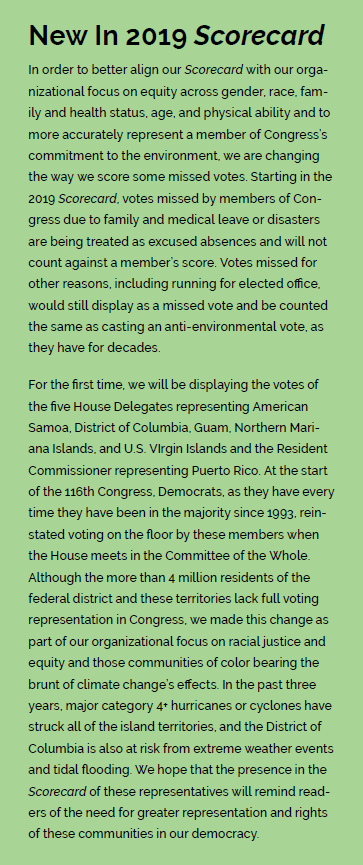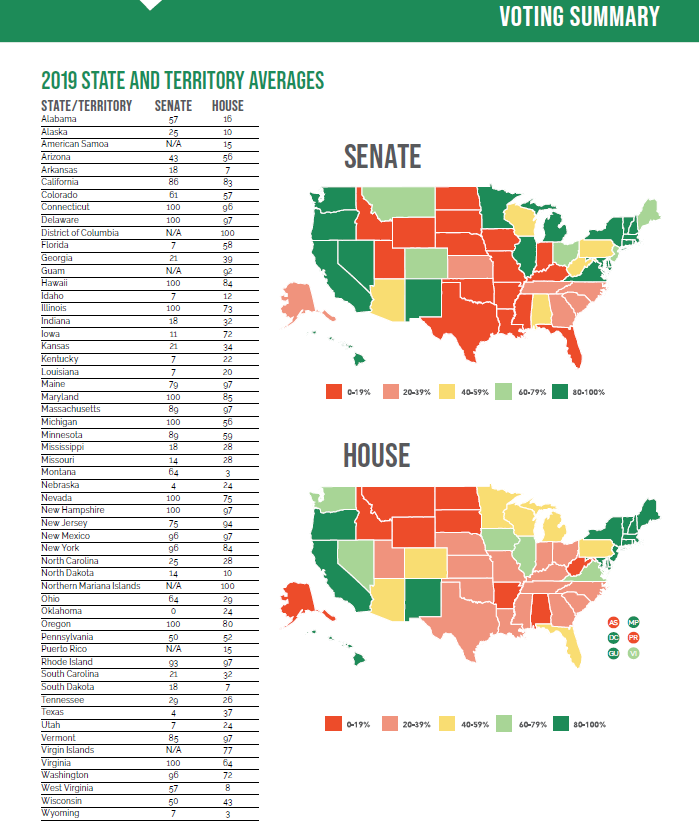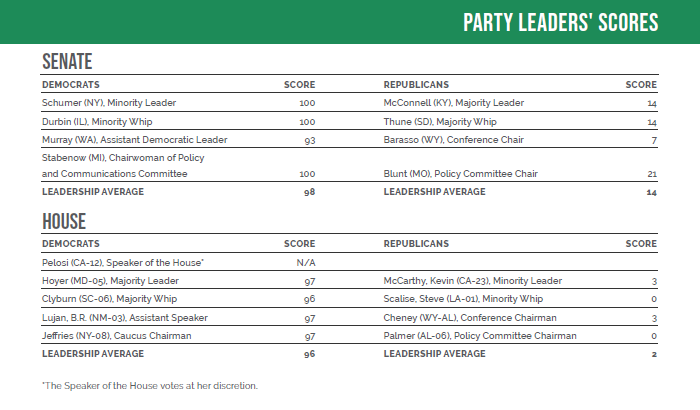
Good Climate News Roundup – February 2025
Mar 5, 2025
 What a difference a year makes. After eight long years of climate change deniers running the show in the U.S. House of Representatives, the 2019 National Environmental Scorecard reflects that Speaker Pelosi (D-CA) and the new pro-environment majority wasted no time passing legislation to protect our air, water, lands and wildlife and to combat the climate crisis.
What a difference a year makes. After eight long years of climate change deniers running the show in the U.S. House of Representatives, the 2019 National Environmental Scorecard reflects that Speaker Pelosi (D-CA) and the new pro-environment majority wasted no time passing legislation to protect our air, water, lands and wildlife and to combat the climate crisis.
At the beginning of 2019, Speaker Pelosi announced that Congresswoman Kathy Castor (D-FL) would lead the new Select Committee on the Climate Crisis, which has led on the more than 120 hearings on climate change the House conducted throughout the year. Furthermore, among the first ten bills of honor, the House introduced and passed a climate bill and two democracy reforms, all of which are critical to our efforts to address the climate crisis. H.R. 9, the Climate Action Now Act, ensures that the Trump administration cannot withdraw from the Paris Climate Agreement, while H.R. 1, the For the People Act, and H.R. 4, the Voting Rights Advancement Act, ensure that all people in this country can equitably participate in our democracy — an undeniably necessary step for protecting our environment and public health in a time when fossil fuel companies are spending excessive amounts to defend their ability to keep polluting.
Over the course of the year, the House went on to pass a diverse set of pro-environment measures. When it comes to public lands, 2019 started on a high note with the enactment of the John D. Dingell, Jr. Conservation, Management, and Recreation Act, a package of public lands bills that permanently reauthorized the Land and Water Conservation Fund (LWCF) and protected over two million acres of public lands and waters. Throughout 2019, the House also passed important bills to protect the Atlantic and Pacific coasts and the eastern Gulf of Mexico from offshore drilling, to restore protections for the pristine and culturally vital Arctic Refuge, and to conserve treasured public lands throughout the west. They also took badly needed steps to protect our air and water from PFAS chemical contamination. And, of course, the House began much needed and long overdue oversight, accountability, and efforts to block the myriad Trump rollbacks of environmental and public health protections.
Even as the House began to make this profoundly needed progress, as reflected by the majority of the 29 votes included in the Scorecard, devastating impacts of the climate crisis continued to worsen across the globe. In the United States, that included destructive flooding in the Midwest, deadly fires and droughts continuing in the West, and more intense hurricanes along the East Coast. Around the globe, the world bore witness to the horrific fires in Australia, the melting of the Arctic permafrost, and the record temperatures in Antarctica. Once again, it is the frontline communities and communities of color, which have already been disproportionately impacted by decades of exposure to toxic pollution, that continue to bear the brunt of the climate crisis.
In more bad news, 2019 was the second hottest year on record, making 18 of the last 19 the hottest ever. And the on the heels of the 2018 IPCC bombshell report that found we have just 12 years to stave off utter catastrophe, several more reports in 2019 reinforced the urgent need to dramatically reduce greenhouse gas emissions, including the disastrous toll that the climate crisis is taking on our oceans.

While it’s clear that the stakes for our environment and our health have never been higher, that seemed to matter not one bit to the Trump administration or Senate Majority Leader Mitch McConnell, both of whom continued to cater to polluters at every opportunity throughout 2019. Senator McConnell refused to act on hundreds of important House-passed bills, including many pro-environment measures found in the 2019 Scorecard, and instead has let them languish in his ever-growing legislative graveyard.
Making matters dramatically worse, at the same time as McConnell blocked important legislation, he worked with the Trump administration to reshape the federal judiciary in ways that will haunt us for decades, confirming an extremely large number of very conservative judges to lifetime appointments. Additionally, McConnell led the Senate in confirming Andrew Wheeler to be administrator of the Environmental Protection Agency and David Bernhardt to be secretary of the Interior, despite both serving as former industry lobbyists who pushed proposals at odds with the mission of the agencies they now run. For the third year in a row, the Senate Scorecard votes are dominated — 8 of 14 — by extreme, partisan nominees to both the federal bench and cabinet and sub-cabinet positions in the Trump administration.
Time and again, it was encouraging to see the pro-environment majority in the House pass so many bills to protect the environment and public health, and it was extremely disappointing to see that progress languish in the Senate. But, in stark contrast with the Republican leadership in the Senate, Democratic Leader Schumer encouraged his caucus to prioritize the climate crisis more than ever, with the vast majority of Senate Democrats signing on as original cosponsors of S. 1743, the International Climate Accountability Act, Senator Jeanne Shaheen’s (D-NH) bill to block the Trump administration from leaving the Paris Climate Agreement and, when it came time to vote on blocking the Trump Administration’s repeal of the Clean Power Plan, most Senate Democrats made the pro-environment choice. Senate Democrats also created the Special Committee on the Climate Crisis and took to the Senate floor early and often throughout 2019 to call attention to the need for climate action.

Unfortunately, 2019 ended on a particularly disappointing note with the failure of the FY2020 appropriations package to extend and expand clean energy and electric vehicle tax incentives; protect the drinking water of communities poisoned by toxic PFAS chemicals; and provide full, permanent funding for the Land and Water Conservation Fund. In addition, the United States-Mexico-Canada Agreement (USMCA) trade bill didn’t even mention the words “climate change” or include any provisions to address it.
These failures make clear, once again, that to get good legislation enacted — the kind of legislation that originated in the House all year — a pro-environment majority in the Senate is necessary. We need to look no further than the historic progress in the states in 2019 to see what can be accomplished when environmental leaders are in power. Twelve states have enacted major clean energy policies since many new pro-environment governors and state legislators assumed office in early 2019. As a result, 1 in 4 people now live in a place committed to 100% clean energy. In addition, six new governors joined the U.S. Climate Alliance, a coalition of 24 bipartisan governors committed to the goals of the Paris Climate Agreement.
It is clear that the states are leading the way and that the federal government must follow. Fortunately, many of the members of Congress who are included in this Scorecard for the first time are determined to ensure that Congress does just that. These are members who ran for Congress in 2018 because they cared so deeply about these issues, and they have led on them since day one in office. In fact, the average 2019 score of the new members who defeated members of LCV’s 2018 Dirty Dozen is 95 percent while the average lifetime score of the members they defeated is 6 percent. LCV is eager to continue working with these environmental champions and so many others across the House and Senate in 2020 and beyond to deliver the environmental and public health results that communities across this country want and deserve.